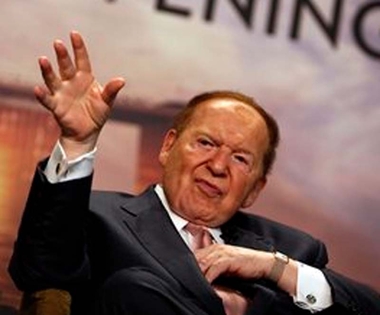AP-NORC Poll: Americans wary of hidden political donors

Washington (AP) — Americans want to know the names of donors who are giving to all groups that work to elect candidates — and by an overwhelming majority believe that requiring disclosure would be an effective way to reduce the influence of money in politics.
The views on disclosure cut across party lines, with 78 percent of Democrats and Republicans alike favoring a requirement that donor names be made public, according to a poll by the Associated Press-NORC Center for Public Affairs Research released this week.
The survey also found that 87 percent think full disclosure would be at least somewhat effective at reducing the influence of money in politics.
"There really is no way to get at the integrity of a campaign, but at least if you know who all the donors are, you can see who is rubbing elbows with who and try to figure out why," said Melissa Byron, an independent in Florida who took the survey and said she leans Republican.
Yet hidden donors abound in the 2016 presidential race.
Many of the major candidates — among them Democratic front-runner Hillary Clinton and Republicans Marco Rubio, Jeb Bush and Mike Huckabee — benefit from outside groups that don't publicly disclose the names of their donors.
Such groups are organized as nonprofits and have limits on how much they can spend promoting candidates, but they've found ways to maximize their impact. For example, a nonprofit called Conservative Solutions Project has spent more than $9.5 million on pro-Rubio television advertising. That's about four times what the candidate himself has spent to date, advertising tracker Kantar Media CMAG shows.
Despite being a major helper to Rubio's presidential bid, Conservative Solutions Project will never have to disclose the names of its donors.
Federal lawmakers have repeatedly proposed a measure that would force these kinds of groups to reveal the names of donors who have given at least $10,000 to campaign-related activities.
Democratic Rep. Chris Van Hollen of Maryland re-introduced the disclosure bill again this year. It has gained the support of a majority of House Democrats but is unlikely to advance in the Republican-controlled chamber.
An earlier version of the legislation, which more narrowly focused on naming corporations giving money to nonprofits, passed the House and failed by a single vote in the Senate in 2010.
Nonprofits are just one part of the maze of political campaign financing.
Also in the game are super PACs, which like nonprofits can raise unlimited amounts of money from donors, but must disclose their names.
And there are the official candidate campaigns themselves, which can collect a maximum of $2,700 per donor per election and must file disclosure reports.
In the AP survey, just 13 percent of respondents said they know quite a bit or a great deal about campaign finance, compared with more than half who said they know only a little or nothing at all.
"It's all quite confusing, but I would just say that the more we know, the better," said Mildred Luongo, a New Jersey Republican who took the survey.
Americans largely accept donor contributions as the best way to pay for political campaigns, the AP survey found, vastly preferring that to something like public financing.
Only about one-quarter of the survey-takers prefer that the federal government provide a set amount of money to each campaign. An additional 17 percent prefer a matching system, in which campaigns are funded primarily using donations but with the federal government matching those smaller contributions to increase their impact.
Peter Baribault, a Florida independent who leans Democratic, was one of the respondents who thought government financing of campaigns was the only way to level the playing field.
"The way it works now with donors, it's a form of buying off the candidates," he said. "So the government today has almost nothing to do with taking care of people. It has to do with taking care of the politicians."
The AP-NORC survey found that Americans are wary of outside groups, a category that includes nonprofits and super PACs. Like nonprofits, super PACs can raise and spend unlimited amounts of money backing specific candidates so long as the candidates themselves aren't directing the outside groups. But super PACs must name their donors.
Nearly nine out of 10 respondents thought that limiting outside spending would curb the influence of money in politics at least somewhat.
One-third of respondents saw outside groups such as super PACs as an acceptable part of the financing of campaigns, compared with 51 percent who say they're unacceptable.
At the same time, the survey takers found donor-disclosing groups like super PACs to be somewhat more palatable than the non-disclosing nonprofits.
The AP-NORC Poll of 1,011 adults was conducted online and by phone Nov. 12-17 using a sample drawn from NORC's probability-based AmeriSpeak panel, which is designed to be representative of the U.S. population. The margin of sampling error for all respondents is plus or minus 3.9 percentage points.
Respondents were first selected randomly using address-based sampling methods, and later interviewed online. People selected for AmeriSpeak who didn't otherwise have access to the Internet were interviewed over the phone.
By Julie Bykowicz and Emily Swanson, Associated Press. Copyright 2015 The Associated Press. All rights reserved. This material may not be published, broadcast, rewritten or redistributed.
The Gayly – December 8, 2015 @ 4:15 p.m.





